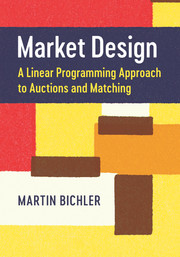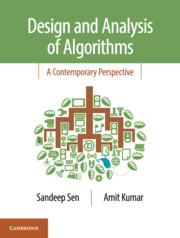Market Design
The digital economy led to many new services where supply is matched with demand for various types of goods and services. More and more people and organizations are now in a position to design market rules that are being implemented in software. The design of markets is challenging as it needs to consider strategic behavior of market participants, psychological factors, and computational problems in order to implement the objectives of a designer. Market models in economics have not lost their importance, but the recent years have led to many new insights and principles for the design of markets, which are beyond traditional economic theory. This book introduces the fundamentals of market design, an engineering field concerned with the design of real-world markets.
- Provides a unified treatment for auctions and matching
- Covers the relevant basics from game theory and mechanism design
- Includes extensive appendices on linear optimization
Reviews & endorsements
'For nearly two decades, Martin Bichler has been a world-wide thought leader in the ways to design those markets that resist traditional, over-simplified analyses. In this book, he develops and articulates a unique approach which, informed by economics and mathematical programming, promises to bring both of those disciplines back to their exciting early roots.' Paul R. Milgrom, Shirley and Leonard Ely Professor of Humanities and Sciences, Stanford University
'The textbook by Martin Bichler takes a mathematical programming approach to market design. By linking pricing issues to duality theory, he provides a framework for analyzing the outcomes of complex mechanisms. This book is suitable for students in economics, operations research, and applied mathematics.' Karla Hoffman, George Mason University, Virginia
'Market Design provides a fresh introduction and unique perspective to this rapidly growing research area at the intersection of economics and operations research. Martin Bichler, who has made seminal contributions in market design himself, introduces a linear programming approach to solve - frequently computationally complex - allocation problems among decentralized and privately informed economic agents. This highly readable introduction is equally well suited for advanced undergraduate or introductory graduate courses in economics, operations research, and computer science.' Dirk Bergemann, Yale University, Connecticut
'Computational integer programming techniques play the central role in running sourcing auctions, spectrum auctions, kidney exchanges, and many other markets. Martin Bichler's book covers the foundations of this topic in a broad range of markets in a highly understandable way. This is must-know information for any market designer.' Tuomas Sandholm, Carnegie Mellon University, Pennsylvania
'This book by Bichler is very readable and suitable for various types of courses such as those for advanced undergraduate and entry level graduate students. It will serve its intended purpose as a textbook for students with backgrounds in computer science, information systems, mathematics, and management science, apart from other disciplines such as economics and operations research … I feel it will also be useful for other categories of readers such as bidders, consultants, market designers, regulators, professionals, and researchers.' S.V. Nagaraj, SIGACT News
Product details
December 2017Adobe eBook Reader
9781316805350
0 pages
0kg
18 b/w illus.
This ISBN is for an eBook version which is distributed on our behalf by a third party.
Table of Contents
- 1. Introduction
- Part I. Microeconomic Fundamentals:
- 2. Game-theoretical basics
- 3. Mechanism design
- 4. Single-object auctions
- Part II. Multi-Object Auction Design:
- 5. An overview of multi-object auctions
- 6. The simultaneous multi-round auction format
- 7. Sealed-bid multi-object auctions
- 8. Open multi-object auctions
- 9. The combinatorial clock auction formats
- Part III. Approximation and Matching Markets
- 10. Approximation mechanisms
- 11. Matching markets
- 12. Outlook
- Part IV. Appendices: Mathematical Optimization
- A. Linear optimization
- B. Algorithms and complexity.









